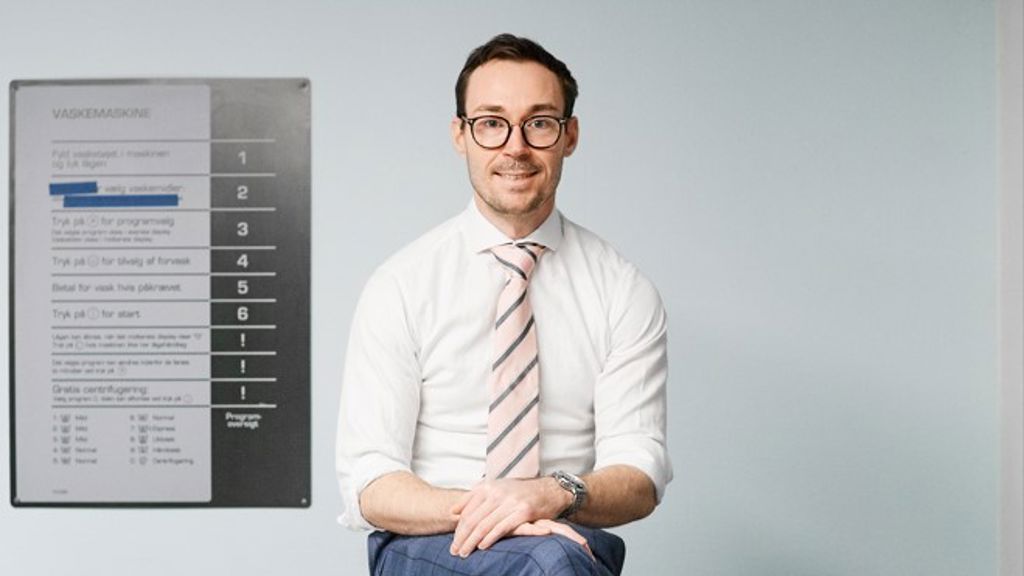Lincoln's pursuit of money launderers has led him from Cape Town and Hong Kong to Copenhagen.
35-year-old Lincoln Gradwell has done quite a few things in the past 10 years. A specialist in fighting money laundering, he has ended up in Denmark by something of a coincidence.
Lincoln Gradwell holds three driving licences.
One from South Africa where he was born and raised. One from Hong Kong, and one from the USA. The US licence is the only one he can convert to a Danish licence. The only problem is that it has expired, so he has to travel to the USA to have it renewed, before he can get a Danish one.
It is hiccups like these he has had to put up with since arriving in Denmark in September.
“But apart from this, I am quite happy,” he says with a smile.
He spent the months up to his arrival pondering whether to stay in Hong Kong, where he had lived with a zero-covid policy and rising Chinese control for three years running, or do like thousands of other people and pack up his life to pursue happiness somewhere else.
A former colleague of his who had left for Denmark in 2021 suggested Copenhagen.

Corruption made him a money laundering specialist
In the past seven years, Lincoln Gradwell has worked in anti-money laundering units at various financial institutions. An area that has been given a lot of attention in recent years.
“When I finished law school in Cape Town, Barclays, a major bank, was recruiting 250 legal assistants and lawyers for a large project aiming to investigate all Politically Exposed Persons (PEPs, editor’s note) for their potential involvement in financial crime. In South Africa, everyone is corrupt, he says laughing and in an English that gives away his family’s Dutch roots a generation earlier.
Well, perhaps not everyone, but corruption is common, he adds.
When the PEP project stopped three months later, he got a permanent position at the bank where he continued chasing people engaged in money laundering and prevented financial crime.
He went from there to Thomson Reuters, a company which, on behalf of financial institutions, monitors different customers within Corporate Investment Banking to ensure their money is ‘clean’.
After the dismantling of apartheid in the 1990s, corruption became ingrained in society, especially in the nation’s energy sector. It had spread to large parts of the rest of the society and the nation’s administration. Later this month, it will be decided if South Africa will be included on the so-called grey list of the Financial Action Task Forces.
A glance at his CV reveals a long list of courses and training that have made him an expert in investigating customers’ private matters and preventing the black sheep from exploiting the banking system for their own gain.
“If you are a bank, you cannot have this kind of customers, and you have to know the customers and the beneficial owners of businesses to be able to comply with the law,” Lincoln Gradwell explains.
Covid was a life-changer
In the autumn of 2019, he moved to Hong Kong. As part of his job, he checked the elite of the Chinese communist party who withdrew money in various ways. Moving money out of China is difficult, so whenever it happened, he needed to check if everything was done properly. The customers’ net worth exceeded 1 million dollars by far, and the company managed assets worth more than 100 billion dollars
But times were difficult for Hong Kong too.
“It was fun in the beginning. There were many expats, conditions were good, and the tax rate was low. Hong Kong was a great city, but the national security law introduced in 2020 made it more difficult to live freely, and it started turning into the form of control we know from China,” he continues.
On top of that, the covid pandemic interfered significantly with the freedom of movement with its requirement to wear face masks and the exclusion from shopping centres, restaurants and leisure activities if your vaccine status was not updated.
For almost two years, Lincoln Gradwell lived and worked almost only in his apartment.
Trapped in Bangkok
He needed a change, so, in the spring of 2022, he applied for a job at Danske Bank. All proficiency and personal tests and job interviews were held online, but the last stage of obtaining a permanent work and residence permit required going to the Danish embassy in Bangkok, Thailand.
This is normally a fast round-trip, but the covid restrictions implied a long quarantine period coming back, and all quarantine hotels were busy. Since he wasn’t able to go to Denmark before September, the best solution was to stay for a month in Bangkok, while waiting for the papers to get sorted.
Much of what he owns is still in Hong Kong, furniture has been passed on to others, and the two suitcases he brought along from Hong Kong contained the life he took with him to Denmark.
Danes are reserved but have a good working culture
The autumn is not the easiest of Danish seasons for going out and meeting new people, and the Danes, known for being reserved, did not make it easier to settle in.
“Danes are very private by nature. I am not exactly sure how to make Danish friends, but I am in a very international team, so there are more of us in the same situation,” he explains.
One thing is certain, the Danish working culture is much better compared to where he comes from: a 40-hour working week with no overtime pay. Many stayed a few hours extra every day, and no one left on time.
“Here, it is entirely different. The working environment is much more relaxed, and people trust each other more. You feel very safe walking around in the city, and things are working.” In South Africa, it is more unsafe, and the power is cut for a few hours a day because energy is in short supply,” he explains, showing us an app that keeps track of when the power is cut in the district you live in.
The number of international colleagues in the financial area has increased significantly over the last decade.
- In InterNations’ survey among expats all over the world (Expat Insider), Denmark is ranked at the bottom when it comes to feeling welcome and building new social networks.
- Internationals in Finance was founded in 2019 by international colleagues in collaboration with Finansforbundet with the aim of creating social and professional networking opportunities for international colleagues as well as with Danish colleagues
- The network’s LinkedIn group now has 924 members
- Examples of planned and held:
- Monthly Thursday bars with around 30-50 participants
- LinkedIn and personal branding
- Diversity, equality and inclusion
- The new collective agreement
- FinTech
- New to the Danish labour market
- Christmas event





